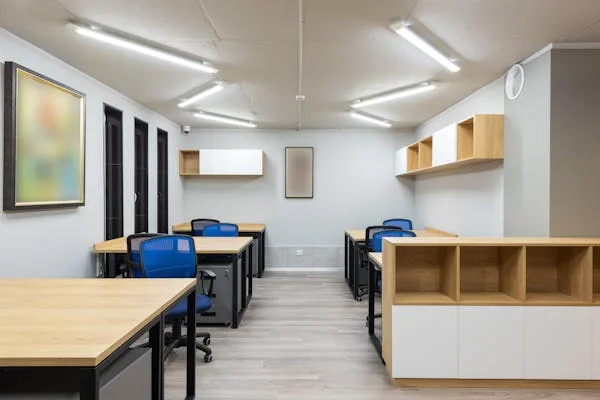Choosing the right office desks is a crucial decision for any business owner. It can have a significant impact on the productivity, comfort, and overall atmosphere of the office. However, many business owners make mistakes when purchasing office furniture that can lead to discomfort, inefficiency, and even increased costs in the long run. Here are the top mistakes to avoid when buying office desks.
1. Failing to Prioritise Ergonomics
One of the most common mistakes business owners make when buying office desks is neglecting ergonomics. A desk that is not ergonomically designed can lead to discomfort, poor posture, and long-term health issues such as back pain, neck strain, and eye fatigue. It’s essential to choose desks that support healthy posture and promote comfort, especially for employees who spend long hours working at their desks.
When purchasing office desks, consider height-adjustable models that allow employees to alternate between sitting and standing. This promotes better posture and reduces the risk of fatigue. Additionally, ensure that the desk has enough surface area for necessary equipment like monitors, keyboards, and paperwork, while maintaining a comfortable and efficient working posture.
2. Ignoring Office Layout and Space Requirements
Another mistake business owners often make is failing to consider the overall layout of the office when selecting desks. It’s important to ensure that the desks you choose fit into the office space properly without causing congestion or making the room feel cramped.
Before purchasing, measure the available space and plan the layout. Think about how the desks will be arranged – whether in open-plan workstations, individual offices, or collaborative areas. Ensuring that desks are appropriately sized and positioned for optimal space utilisation can make a significant difference in the functionality and flow of the office.
3. Choosing Style Over Functionality
While aesthetics are important, many business owners make the mistake of choosing desks based on appearance rather than functionality. A stylish desk might look great in a showroom, but if it doesn’t offer enough storage, adjustability, or durability, it could quickly become a hindrance to productivity.
When buying office desks, it’s essential to balance style with practicality. Look for desks that are durable, spacious, and equipped with functional features like cable management systems, drawers, or compartments. The right office furniture should not only look good but also provide a comfortable and efficient workspace for employees.
4. Underestimating Storage Needs
Another common mistake is underestimating the storage needs of employees. Many office desks are designed with minimal storage options, but as business owners, it’s crucial to consider the organisational requirements of your team. A lack of proper storage can lead to clutter, disorganisation, and a reduction in overall productivity.
When purchasing desks, ensure that they come with enough built-in storage options, such as drawers, filing cabinets, or shelves. If the desks do not have sufficient storage space, you may need to invest in additional office furniture, such as filing cabinets or storage units, to keep the workspace organised and efficient.
5. Not Considering the Long-Term Durability
Business owners often make the mistake of opting for cheaper desks without considering the long-term durability of the office furniture. While it’s tempting to save money upfront, low-quality desks may not last as long, leading to more frequent replacements and ultimately higher costs over time.
When purchasing office desks, it’s essential to think about durability. Look for desks made from high-quality materials, such as solid wood, metal, or sturdy composite materials. These desks will withstand the wear and tear of daily use and maintain their functionality and appearance over time, saving you money in the long run.
6. Failing to Account for Employee Preferences
Every employee has different preferences when it comes to their workspace. Some may prefer a minimalist desk with plenty of open space, while others may need more storage or additional features. Failing to consider these individual preferences can lead to dissatisfaction and decreased productivity.
To avoid this mistake, involve your employees in the decision-making process. Ask for their input on what features they would find most useful, such as adjustable desks, more storage, or additional workspace. This will ensure that the office furniture meets the needs of everyone and helps create a comfortable, productive work environment.
7. Overlooking Cable Management
With the increasing use of technology in the workplace, managing cables has become a significant concern. Many office desks are designed without proper cable management systems, which can lead to tangled wires, a messy workspace, and potential safety hazards.
When buying office desks, ensure that they come with built-in cable management features, such as grommets, trays, or clips, to keep cords organised and out of sight. This will not only help maintain a tidy and professional workspace but also reduce the risk of accidents and improve the overall aesthetics of the office.
8. Not Considering Adjustability Options
In today’s modern office, employees are spending more time at their desks than ever before. As such, having a desk that offers adjustability is crucial. Desks that are not adjustable may lead to discomfort and poor posture, especially if employees are unable to customise their workspaces to suit their individual needs.
When selecting office desks, opt for models that offer height adjustability, tilt options, or even sit-stand desks. This allows employees to personalise their workspace for maximum comfort and productivity. Adjustable desks also accommodate a wide range of employees, making them an ideal choice for diverse teams.
9. Focusing Too Much on Price
Price is always an important consideration when purchasing office furniture, but focusing solely on cost can lead to subpar decisions. Choosing the cheapest desks may seem like a good idea initially, but if the quality is poor, they may require frequent replacements or maintenance, which could cost more in the long run.
Instead of focusing solely on price, consider the overall value of the desks. Look for a balance between quality, durability, and functionality, and choose desks that meet your needs while staying within budget. In the long term, investing in higher-quality office furniture can improve productivity and reduce maintenance costs.
10. Forgetting About Future Growth
Many business owners make the mistake of purchasing office desks without considering future growth. If your company expands or hires new employees, you’ll need to accommodate additional desks and furniture. Failing to plan for growth can lead to overcrowded workspaces and logistical challenges.
When buying office desks, think about how they will fit into your office as your business grows. Consider choosing modular or flexible desk systems that can be easily expanded or reconfigured to meet future needs. This ensures that your office furniture investment is adaptable and sustainable in the long term.
The Importance of Office Furniture in Creating a Productive Workspace
Choosing the right office desks is just one part of creating an efficient and comfortable workspace. The right office furniture, including chairs, storage units, and filing systems, is equally important in ensuring that your office promotes productivity and employee well-being. By avoiding the common mistakes listed above, you can create a workspace that supports both the physical and functional needs of your team, leading to improved morale, productivity, and overall success.





